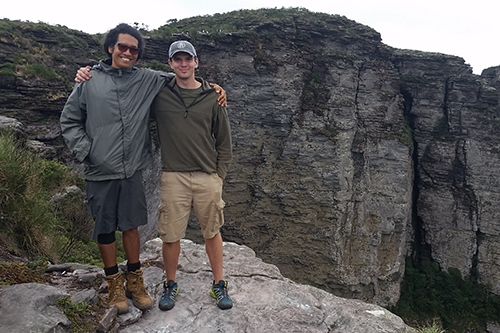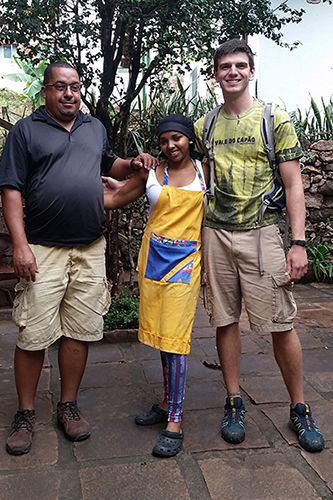
Justen Geddes ’18 poses with his hiking guide, Toni, in a national park in Brazil. He is one of the people Justen met who transformed his perspective on his study abroad trip to Brazil.
Last summer, Campus Auxiliary Services First-Time Study Abroad scholarship recipient Justen Geddes ’18 explored history and challenges and culture of African diaspora in Brazil. It was the first time he had been outside of the United States. It changed his outlook, and his future.
— Essay by Justen Geddes ’18
Fifteen minutes. That’s all the time it took for me to decide I was going to commit to study abroad after reading the description of The African Diaspora course in Bahia, Brazil.
In those 15 minutes I did not research the political situation, or any inequalities of Brazil, or what diaspora really means. All I thought about was how small New York is. At 19, I was expected to make some of the biggest decisions of my life and I had never been out of the country; not even to Canada.
How can I make decisions that affect the next 50 years, when I haven’t been influenced by the rest of the world? I paid the trip deposit, then looked up what African diaspora is and what anthropology entails.
In the months leading up to trip, I was confident in my ability to survive in another country. That confidence immediately left when I landed in Saõ Paulo and tried to talk to the immigration officer with my small bit of Portuguese. Standing there, looking at my passport, then at the woman, then back at my passport, I thought for sure I was going to get shipped back to America. But the woman busted out into laughter and I followed suit. I had been in Brazil for all of 20 minutes and had already learned one of the biggest lessons of the trip — we are all humans.
It sounds so simple yet it is an idea not many of us truly realize. You, me, the man who just flashed you some angry signals on the highway, your best friend — we are all the same. We all have good days, bad days, and days when all we can do is laugh because we are so terrified, as was my case at the airport. And, other humans, like that immigration officer, can help us in bigger ways than they know.
From Saõ Paulo we flew to Salvador and from Salvador to Lançóis: a town in the middle of nowhere nestled closely to the Chapada Diamantina national park. I knew I would like it there when I saw that the airport had one runway and we had to drive over an hour to get to town. When we arrived in Lançóis, for the first time in my life I felt at home. I hadn’t even spent an hour there before I knew that I loved the place. The town’s main attraction was that it is close to the national park, which made it a perfect place for eco-tourists to eat and stay while not in the park.
After a few days, my class set out on a five-day trek. It was then when I met Toni Rouvenat, our hiking guide. My first impression of Toni was that he was a twenty-something, happy-go-lucky man with a giant, fluffy pony tail. During the trek, I learned that Toni is actually in his late thirties and is one of the smartest men I have ever met. Toni taught me many lessons; including his approach to life. Whenever I would ask Toni how he was he would respond “Always good, brother!” He always did so with the biggest smile. He later said to me that “There is always going to be something to be sad about, something to worry about, but life is too short! Life is too short not to be happy.”
He said that while we were struggling up an incline that was so steep it was practically a cliff, and he was carrying a pack that I could barely pick up. He never stopped smiling, 20 kilometers hiking a day. In the middle of the park, I could not help but think back to my first day, and the immigration officer, and how all of us are similar. Yet we are also so uniquely different: while I was having the time of my life on the trek, some of my friends would have done anything go back to the city of Salvador.
As humans we have so much in common, yet we are all so different.

We eventually made our way back to Lançóis in time for the Saõ João festival. This festival consists of three days of dancing into the early morning and almost every family building a fire in the street outside their house. It was the most amazing holiday I could imagine. There was music, dancing, delicious food and fire everywhere. I eventually took a second to think about what was happening. These people work extremely hard all day, in the heat. The people around me that were dancing like they belong on stage were doing rugged and hard work about two hours beforehand. They most likely had just enough time to shower and put on clean clothes before coming out to celebrate the day.
This is in sharp contrast of life in America. Growing up, when my parents and I came home from school and work we spent the evening with each other, only seeing friends and family on weekends. In Lançóis, people would hang their heads out of their windows if they had nothing to do just to talk to people as they walked by.
Going abroad greatly changed how I perceive the world, but not in the ways I thought it would.
The most eye-opening experience from my time in Brazil was seeing how different cultures value different things more than others. For example, in America consumerism is key, while in Lançóis the majority of people did not have enough money to be extreme consumers. In Lançóis, people placed emphasis on happiness and community.
I realized then that I know exactly what I want to do for the next 50 years of my life.
I want to enjoy my life, and help people enjoy theirs. I want to live life as passionately as the people in Lançóis dance. I want to love my work as much as Toni does. I want to wake up every morning and have the courage and audacity to chase after crazy ideas that I think can change the world.
Related Stories
No post found!
